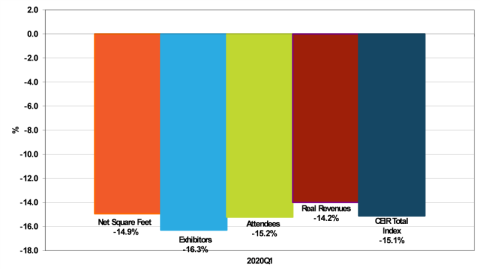CEIR Total Index: Q1 2020 Trade Show Industry Growth Drops 15 Percent

Growth of the exhibition industry plunged more than 15 percent during the first quarter of 2020 during which 72.6 percent of events originally scheduled for the second half of March were canceled, according to the Center for Exhibition Industry Research.
The remaining 27.4 percent of the events were postponed and some of those events may eventually be canceled as well.
The massive negative growth was tracked by the CEIR Total Index, a measure of exhibition industry performance, which also reported a modest 0.3 percent year-over-year gain of inflation-adjusted GDP.
The GDP results had been somewhat buffered by continued opening of essential businesses and online purchases.
“Prior to the lockdown, the fundamentals of the exhibition industry were in good standing as the growth of exhibitions continued,” said CEIR Economist Allen Shaw, Ph.D., Chief Economist for Global Economic Consulting Associates, Inc.
He added, “Social distancing will remain a challenge for the exhibition industry for the remainder of the year.”
All exhibition metrics in the first quarter posted sharp year-over-year declines.
Exhibitors and attendees posted the largest drop of 16.3 percent and 15.2 percent, respectively.
Net square feet decreased 14.9 percent, whereas real revenues (nominal revenues adjusted for inflation) tumbled 14.2 percent.
“The exhibition industry is a key business driver for hotels, airlines, restaurants and ground transportation as well as for the broader U.S. economy. In 2019, the industry contributed more than $101 billion to U.S. GDPI,” said CEIR CEO Cathy Breden, CMP, CAE, CEM.
She added, “It is incumbent for Federal financial rescue programs to extend to event organizers and service providers so that the exhibition industry can help buoy economic recovery by helping keep businesses alive and help people keep their jobs and put millions of people back to work.”
Were it not for the start of the pandemic crisis, the exhibition industry was poised to continue growth as forecasted.
Excluding the cancelled events in March, the Total Index grew by a modest 0.3 percent. All exhibition metrics except exhibitors posted moderate year-over-year gains.
Real revenues rose 1.0 percent and both NSF and attendees increased by a modest 0.7 percent. Exhibitors declined 1.0 percent from a year ago.
Excluding cancelled events, Government; Transportation; and Industrial/Heavy Machinery and Finished Business Inputs all registered robust year-over-year gains. In contrast, Building, Construction, Home & Repair; Discretionary Consumer Goods and Services; and Raw Materials and Science posted year-over-year declines.


Add new comment